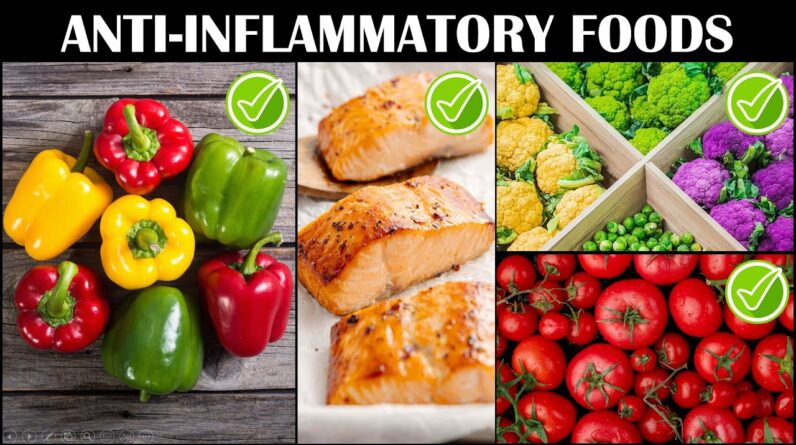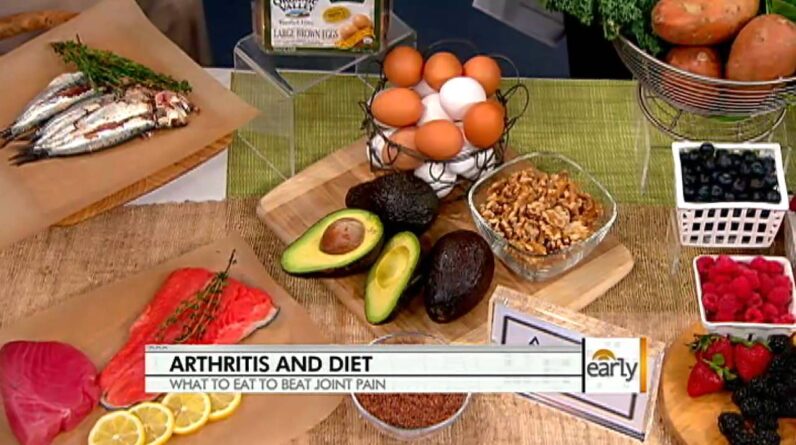
Inflammation is a natural response by our bodies to protect against injury or infection. However, chronic inflammation can contribute to various health conditions, including heart disease, cancer, and diabetes. One effective way to combat inflammation is through a balanced and nutritious diet. That’s why we’re here to introduce you to the top 10 anti-inflammatory foods that you can easily incorporate into your daily meals. These foods, such as berries, fatty fish, broccoli, avocados, green tea, grapes, turmeric, and extra virgin olive oil, are not only delicious but also packed with antioxidants and compounds that have anti-inflammatory effects. Including these foods in your diet can help reduce the risk of chronic diseases associated with inflammation. So, let’s delve into the world of anti-inflammatory foods and start promoting a healthier lifestyle together!
Remember, we’re not medical professionals, so it’s always important to seek advice from a healthcare professional for any medical condition. But by making simple dietary changes and incorporating these wonderful foods into your meals, you can take a big step towards reducing inflammation and promoting your overall health and well-being. Stick around as we provide you with more detailed information about each of these top 10 anti-inflammatory foods and discover how they can make a significant impact on your journey towards a healthier lifestyle.
The Importance of an Anti-Inflammatory Diet
Inflammation is a natural response by the body to protect against injury or infection. It is a crucial part of the body’s defense mechanism as it helps to remove harmful substances, destroy pathogens, and initiate the healing process. However, chronic inflammation can contribute to various health conditions, including heart disease, cancer, and diabetes. That’s why it is important to manage inflammation through a balanced and nutritious diet.
Understanding Inflammation
Inflammation occurs when tissue is damaged, and immune cells release various chemical signals that trigger the inflammatory response. It is a normal and essential process that helps the body heal. However, chronic inflammation is different and can be harmful. It occurs when the inflammatory response persists for an extended period, often without a clear resolution of the initial cause. Chronic inflammation has been linked to numerous health problems, including cardiovascular disease, diabetes, arthritis, asthma, certain cancers, and neurodegenerative disorders.
The Impact of Chronic Inflammation on Health
Chronic inflammation can have significant consequences for our overall health. It can contribute to the development and progression of various diseases, including heart disease, cancer, and diabetes. It can also lead to the breakdown of tissues and organs over time. Managing chronic inflammation is essential for maintaining optimal health and reducing the risk of chronic diseases associated with inflammation.
The Power of Anti-Inflammatory Foods
A balanced and nutritious diet can help combat inflammation and promote overall health. Including anti-inflammatory foods into our daily meals can have a significant impact on reducing inflammation and improving our well-being.
Introduction to Anti-Inflammatory Foods
Anti-inflammatory foods are packed with antioxidants and compounds that have anti-inflammatory effects. They help reduce inflammation in the body and lower the risk of chronic diseases associated with inflammation. By incorporating these foods into our diet, we can promote a healthier lifestyle and support our body’s natural defenses against inflammation.
Top 10 Anti-Inflammatory Foods
-
Berries: Berries, such as strawberries, blueberries, raspberries, and blackberries, are not only delicious but also packed with fiber, vitamins, and minerals. They contain anthocyanins, powerful antioxidants that have been found to reduce the risk of chronic diseases and possess anti-inflammatory properties.
-
Fatty Fish: Salmon, sardines, herring, mackerel, and anchovies are excellent sources of protein and omega-3 fatty acids. These fatty acids, particularly EPA and DHA, help reduce inflammation, prevent metabolic syndrome, heart disease, diabetes, and kidney disease.
-
Broccoli: Broccoli is a highly nutritious cruciferous vegetable that offers a myriad of health benefits. It contains sulforaphane, an antioxidant known for its anti-inflammatory effects. Eating cruciferous vegetables, including broccoli, can decrease the risk of heart disease and certain cancers.
-
Avocados: Packed with potassium, magnesium, fiber, and heart-healthy monounsaturated fats, avocados are a great addition to an anti-inflammatory diet. They also contain carotenoids and tocopherols, which have been linked to a reduced risk of cancer and heart disease. Avocados may even help reduce inflammation in the body.
-
Green Tea: Green tea, particularly matcha green tea, is renowned for its health benefits. It contains epigallocatechin-3-gallate (EGCG), a powerful antioxidant that possesses anti-inflammatory properties. Regular consumption of green tea has been associated with a decreased risk of heart disease, cancer, obesity, and Alzheimer’s disease.
-
Grapes: Grapes are not only sweet and refreshing but also contain anthocyanins, which have anti-inflammatory effects. Consuming grapes may decrease the risk of various diseases, including heart disease, diabetes, obesity, arthritis, Alzheimer’s, and eye disorders. Grapes are also a rich source of resveratrol, another antioxidant that protects the heart against inflammation.
-
Turmeric: Turmeric is a spice widely used in Indian cuisine, known for its warm, earthy flavor. It contains curcumin, a powerful anti-inflammatory compound. Research has shown that curcumin can help reduce inflammation associated with arthritis, diabetes, and other diseases. Taking curcumin supplements alongside black pepper extract (piperine) can enhance its absorption and effectiveness.
-
Extra Virgin Olive Oil: Extra virgin olive oil, a staple in the Mediterranean diet, is one of the healthiest fats you can consume. It is rich in monounsaturated fats and contains oleocanthal, an antioxidant with potent anti-inflammatory properties. Studies suggest that incorporating extra virgin olive oil into your diet can reduce the risk of heart disease, brain cancer, obesity, and other serious health conditions.
By including these top 10 anti-inflammatory foods in our diet, we can reduce the risk of chronic diseases associated with inflammation and promote overall health.

This image is property of i.ytimg.com.
Exploring the Benefits of Peppers in an Anti-Inflammatory Diet
Peppers are a versatile and delicious addition to an anti-inflammatory diet. They come in a variety of colors and flavors and offer numerous health benefits, thanks to their high content of vitamins, minerals, and antioxidants.
Vitamin C and Capsaicin: A Dynamic Duo
Peppers are an excellent source of vitamin C, which is a potent antioxidant that helps reduce inflammation. Antioxidants protect the body’s cells from damage caused by free radicals, which are highly reactive molecules that contribute to inflammation. Additionally, peppers contain capsaicin, a compound responsible for their spicy flavor. Capsaicin has been shown to have anti-inflammatory and pain-relieving properties, making it beneficial for individuals with inflammatory conditions.
Different Types of Peppers and Their Anti-Inflammatory Properties
Peppers come in various types, each with its unique set of nutrients and health benefits. Some of the most common types of peppers include bell peppers, chili peppers, and jalapenos. Bell peppers are rich in antioxidants, including vitamin C and carotenoids, which help reduce inflammation. Chili peppers, on the other hand, contain capsaicin, which has been studied for its anti-inflammatory effects. Jalapenos, a popular choice in spicy dishes, also contain capsaicin, which can help alleviate pain and reduce inflammation.
By incorporating peppers into our anti-inflammatory diet, we can enjoy their vibrant flavors while reaping the benefits of their anti-inflammatory properties.
The Role of Dark Chocolate in Reducing Inflammation
Dark chocolate, with its rich and indulgent taste, may seem like an unlikely addition to an anti-inflammatory diet. However, dark chocolate contains certain compounds that have been shown to have anti-inflammatory effects and offer potential health benefits.
The Flavanols in Dark Chocolate
Dark chocolate is rich in flavanols, a type of flavonoid that possesses antioxidant and anti-inflammatory properties. Flavanols have been found to decrease inflammation in the body and improve heart health. They do this by reducing the production of inflammatory molecules and increasing the production of nitric oxide, which helps relax and widen blood vessels, improving blood flow.
Choosing the Right Dark Chocolate for an Anti-Inflammatory Diet
Not all dark chocolates are created equal when it comes to their health benefits. To reap the anti-inflammatory benefits of dark chocolate, it’s important to choose a high-quality product with a high cocoa content. Look for dark chocolate that contains at least 70% cocoa solids or higher. Avoid dark chocolates with added sugars or other additives, as these can negate the health benefits.
Remember to enjoy dark chocolate in moderation as part of a balanced diet. While it can offer potential health benefits, it is still a calorie-dense food and should be consumed in moderation.
Mushrooms as a Powerful Anti-Inflammatory Food
Mushrooms are not only a delicious addition to meals but also offer numerous health benefits, including their anti-inflammatory properties. These fungi have been used for centuries in traditional medicine for their immune-boosting properties and potential to reduce inflammation.
The Immune-Boosting Properties of Mushrooms
Mushrooms contain various bioactive compounds that contribute to their immune-boosting and anti-inflammatory effects. One of the most well-known compounds found in mushrooms is beta-glucans, which have been shown to enhance immune system function and reduce inflammation. Additionally, mushrooms are a good source of antioxidants, such as selenium, which help protect cells from damage caused by oxidative stress.
Popular Mushroom Varieties and Their Anti-Inflammatory Benefits
Different mushroom varieties offer unique health benefits and flavors. Some of the most popular mushroom varieties include shiitake, reishi, and oyster mushrooms.
Shiitake mushrooms have been used in traditional medicine for centuries due to their potential immune-modulating and anti-inflammatory effects. They are rich in compounds called polysaccharides, which have been found to enhance immune system function and reduce inflammation.
Reishi mushrooms are highly valued in traditional Chinese medicine for their immune-boosting and anti-inflammatory properties. They contain triterpenoids, which have been shown to have anti-inflammatory effects and support the immune system.
Oyster mushrooms are packed with antioxidants, including ergothioneine, which has been found to reduce inflammation and protect against oxidative stress.
By incorporating a variety of mushrooms into our meals, we can enjoy their unique flavors while benefiting from their immune-boosting and anti-inflammatory properties.
The Anti-Inflammatory Effects of Tomatoes
Tomatoes are a versatile and nutritious fruit that can be easily incorporated into a variety of dishes. They not only add flavor and color to meals but also offer numerous health benefits, thanks to their high content of vitamins, minerals, and antioxidants.
The Power of Lycopene in Tomatoes
Tomatoes are particularly rich in lycopene, a powerful antioxidant that gives them their vibrant red color. Lycopene has been extensively studied for its potential health benefits, including its anti-inflammatory effects. Studies have shown that lycopene can reduce the production of pro-inflammatory compounds and decrease markers of inflammation in the body.
Different Ways to Incorporate Tomatoes into Your Diet
There are numerous ways to incorporate tomatoes into your diet, whether raw, cooked, or in the form of sauces and salsas. Here are a few ideas:
-
Fresh Tomato Salad: Slice ripe tomatoes and combine them with fresh herbs, olive oil, and a sprinkle of salt for a refreshing and healthy salad.
-
Tomato Sauce: Make homemade tomato sauce using fresh or canned tomatoes, garlic, onions, and herbs. Use it as a base for pasta dishes or as a topping for pizzas.
-
Roasted Tomatoes: Roast cherry tomatoes in the oven with a drizzle of olive oil and your favorite herbs. They make a delicious side dish or can be added to salads and sandwiches.
-
Tomato Salsa: Dice tomatoes and combine them with onions, jalapenos, cilantro, lime juice, and a pinch of salt for a tangy and flavorful salsa. Serve with tortilla chips or use as a topping for tacos and grilled meats.
Remember to choose ripe and flavorful tomatoes for the best taste and nutritional benefits. Aim to include tomatoes in your meals regularly to enjoy their anti-inflammatory effects.
Tips for Including These Foods in Your Anti-Inflammatory Diet
Incorporating anti-inflammatory foods into your diet doesn’t have to be complicated. Here are some tips for including these foods in your daily meals:
Diversify Your Plate with Colorful Peppers
Add a variety of colorful peppers to your meals. Sauté them with other vegetables for a vibrant stir-fry, stuff them with lean protein and whole grains for a healthy and flavorful meal, or roast them and serve them as a side dish.
Indulge in Dark Chocolate in Moderation
Enjoy a small piece of dark chocolate as a treat. Choose high-quality dark chocolate with at least 70% cocoa content to reap its potential health benefits. Remember to savor it mindfully and enjoy it in moderation as part of a balanced diet.
Getting Creative with Mushroom-Based Dishes
Experiment with different mushroom varieties to discover new flavors and textures. Add sliced mushrooms to your favorite stir-fries, soups, or omelets. You can also stuff large mushroom caps with a mixture of vegetables, herbs, and cheese for a delicious and nutritious meal.
Incorporating Tomatoes into Everyday Meals
Use fresh tomatoes in salads, sandwiches, and salsas. Make homemade tomato sauces for pasta dishes and pizzas. Roast cherry tomatoes as a flavorful side dish or add them to grain bowls and salads. With their versatility, tomatoes can easily be added to a wide range of everyday meals.
By incorporating these tips into your daily routine, you can enjoy a varied and flavorful diet while reaping the benefits of anti-inflammatory foods.
Conclusion
Incorporating anti-inflammatory foods into your diet is a simple and effective way to support your body’s natural defenses against inflammation. Berries, fatty fish, broccoli, avocados, green tea, grapes, turmeric, extra virgin olive oil, peppers, dark chocolate, mushrooms, and tomatoes are all delicious and readily available options that can help fight inflammation. By making simple dietary changes and choosing a variety of colorful, antioxidant-rich foods, you can promote a healthier lifestyle and reduce the risk of chronic diseases associated with inflammation. Remember to always consult with a healthcare professional for personalized advice, especially if you have any underlying medical conditions. Take charge of your health by nourishing your body with anti-inflammatory foods and enjoying the many benefits they offer.






